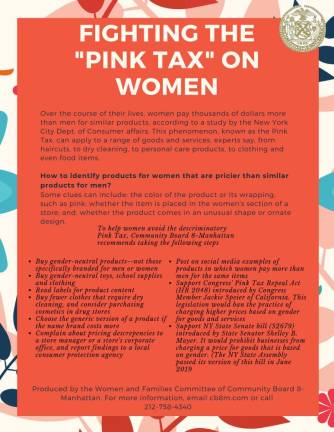Fairness for Female Consumers
A Manhattan community board is determined to stop unfair pricing practices known as "the pink tax"

Women in New York City are often subjected to the so-called “Pink Tax,” the phenomenon where they pay more than men do - 7 percent overall - for identical or similar products. The Women and Families Committee at Community Board 8 on the Upper East Side is crusading to alert the public to this pervasive inequity.
To date, there is no law against charging women more this way. “There has to be either legislation, or a determined effort by the public to change these things,” said Alida Camp, chair of CB8.
‘From Cradle to Cane: The Cost of Being a Female Consumer,’ a 2015 study from New York City'sDepartment of Consumer Affairs surveyed 794 products across five different industries and found that “In every industry, products for female consumers were more likely to cost more.” The researchers found that women pay an average of 13 percent more for personal care products than men.
And seniors are no exception. According to the study, in 2015, RiteAid was charging men $11.99 for 52 adult diapers, while women were paying the same amount for 13 fewer pads. The cost per diaper worked out to 23 cents for men and 30 cents for women.
Four years later, an informal online search by Straus News found that, while RiteAid did change the price for adult diapers for both men and women, women are still paying more. While men pay $9.49 for 52 adult diapers, women pay $8.49 for 39 pads. So men pay an average of 18¢ per pad, while women pay an average of 21¢ per pad.
The Legislative Agenda
On the law-making front, the Pink Tax Repeal Act, introduced in Congress in April, would ban the practice of charging for goods and services based on gender. It is currently in the first stage of its legislative process, awaiting a committee consideration.
State Assembly Member Rebecca Seawright said she co-sponsored a bill passed by the New York State Assembly this session to eliminate “charging more for goods of a substantially similar or like kind based on a person's gender.” A State Senate version of the bill is currently in the Senate Rules Committee.
In New York City, the pink tax is not yet illegal for goods, but it is it illegal for services, and it has been since 1998, when Mayor Rudolph Giuliani signed a bill into law prohibiting businesses from “basing prices purely on gender.” This also gave the Department of Consumer Affairs the power to issue violations to anyone engaged in gender-priced discrimination.
A Grassroots Effort
CB8 set out to raise awareness and provide Upper East Siders with tools on how to avoid the pink tax, and ultimately, hopefully, eliminate it altogether. Camp emphasized that it was important for elected officials and others to inform the public about the issue now, during the holiday shopping season.
“It’s worked before,” Camp said. The power, she explained, is in the hands of consumers. “You walk into a store, and you don’t buy something, and you don’t buy it, and you don’t buy it, and you don’t buy it – that tells the manufacturers that there’s something wrong with what they’re doing.”
“This grassroots effort is what’s so important in New York City,” said Margaret Price, co-chair of CB8’s Women & Families Committee. CB8 has created a flyer, available on its website and circulating in the neighborhood, with tips to help women “quickly determine whether something is being simply targeted to women.”
The tips include buying gender neutral products, complaining to store managers, posting to social media when a pink tax is discovered and supporting the ongoing legislation. Said Camp: “It’s an insidious burden, and a remnant and a symptom of inequality.”